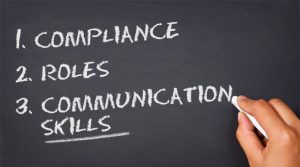3 Important Things the EMS Front Office Must Teach EMS “Newbies” About Billing
They won’t osmose…
While updating our CPR certification recently, a quick scan of the room produced a very young student face or two. You know the eager beaver look of a person that is so new to the EMS system that they can’t wait to put their skills to use.
So it made us think.

Just like these young plebes won’t absorb CPR skills without proper training, so also they won’t osmose how they contribute to our ability to collect reimbursement dollars.
We have to teach new staff about compliance, where they fit in the reimbursement machinery and how to effectively communicate back to us just like every other skill we have to teach them.
There are three things EMS administrators (and the billing office by association) must teach (and you “newbies” must learn) if we are serious about playing by the rules to collect reimbursement dollars effectively.
1. We Must Teach Compliance!
The first and most important thing we must instill into our new EMS staff members is a culture of compliance.
Before our new people answer the first page, respond to an incident, provide their first patient care and ultimately document that first run in a PCR; we must teach them that above all remaining compliant is always the top goal.
From a billing perspective, this means we have to teach them the basics. They must understand the concepts of Medical Necessity and Reasonableness.
Clearly define the phrase medical necessity for your staff and teach them how the concept is applied within the context of the PCR they prepare following the run. Then we instruct them to communicate back to us regarding the reasonableness of the incident.
Train them to ask these questions and communicate the answers using their PCR.
- Could my patient have been transported by any other means without potential harm to his/her well-being?
- Was there really a compelling reason why this patient needed an ambulance right now at this very moment?
Of course, we must empower them and help them understand that the answers to these questions may be “Yes” and “No”. Above all they must know that you never expect anything but the truth in their reports. Some trips just aren’t appropriate to be reimbursed.
2. We Must Teach Roles
New EMS people must understand where they fit into the overall machinery.
These new people must be taught and then frequently reminded that the information they collect (or don’t collect) about the patients they touch will ultimately determine the success or failure of your EMS billing program.
Every single member of your staff must clearly understand that he/she is the gateway to the reimbursement process.
3. We Must Teach Communication Skills
Finally we must teach and encourage both excellent written and verbal communication skills.
Remember, we’re talking about a whole new generation of young people who talk and interact with their thumbs on little hand-held computer devices. Today’s young EMS responder’s brain is configured in a whole new language.
When your humble author walked the halls of a high school, writing anything close to…
“How r u doing? Wazzup?
…would have landed me with a big fat “F” and a dunce cap in the corner of my very proper English teacher’s stale, musty classroom.
Today, this is the way written communication happens.
So, is it any wonder when we instruct new staff members that they are required to write full sentences, use spell-check and “paint a picture in words” about their EMS incident that they look at us like we are the 3-headed monster from their favorite digital gaming obsession?
Pound home the message, repeatedly, that the PCR they complete is a legal document. We must instill in these people that this is a functional, historical medical record which is part of a larger set of documentation that provides a sustainable record of each patient’s medical history and treatment and ultimately will justify if payment of the resulting third-party insurance claim is appropriate.
On the heels of the written, comes instruction in the verbal and interpersonal side of communications.
We must teach every street staff member that they are empowered to communicate to the front office when things just don’t appear to be all on the up-and-up. These people are your boots-on-the-ground so be sure you clearly communicate to them that it’s okay for them to let you know what’s going on outside the office walls.
Simply…tell them they are not in trouble if they tell you about a trip that shouldn’t be billed to insurance- especially when the trip involves a Medicare and Medicaid beneficiary.
Now Apply…
Now it’s time for you to apply our suggestions.
Foster a compliance culture, make sure your staff knows where they fit and the role they play and educate them about how to communicate effectively. The positive impact to your EMS billing program will be noticeable.
